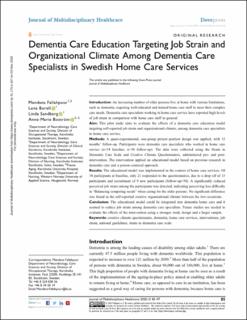| dc.contributor.author | Fallahpour, Mandana | |
| dc.contributor.author | Borell, Lena | |
| dc.contributor.author | Sandberg, Linda | |
| dc.contributor.author | Bostrøm, Anne-Marie | |
| dc.coverage.spatial | Sweden | en_US |
| dc.date.accessioned | 2020-11-27T11:20:09Z | |
| dc.date.available | 2020-11-27T11:20:09Z | |
| dc.date.created | 2020-07-29T13:29:39Z | |
| dc.date.issued | 2020 | |
| dc.identifier.citation | Fallahpour, M., Borell, L., Sandberg, L., & Boström, A.-M. (2020). Dementia care education targeting job strain and organizational climate among dementia care specialists in Swedish home care services. Journal of Multidisciplinary Healthcare, Volume 13, 85–97 | en_US |
| dc.identifier.issn | 1178-2390 | |
| dc.identifier.uri | https://hdl.handle.net/11250/2689923 | |
| dc.description.abstract | Introduction: An increasing number of older persons live at home with various limitations, such as dementia, requiring well-educated and trained home care staff to meet their complex care needs. Dementia care specialists working in home care service have reported high levels of job strain in comparison with home care staff in general.
Aim: This pilot study aims to evaluate the effects of a dementia care education model targeting self-reported job strain and organizational climate, among dementia care specialists in home care service.
Methods: A quasi-experimental, one-group pretest–posttest design was applied, with 12 months’ follow-up. Participants were dementia care specialists who worked in home care service (n=34 baseline; n=30 follow-up). The data were collected using the Strain in Dementia Care Scale and Creative Climate Questionnaires, administered pre- and post-intervention. The intervention applied an educational model based on previous research in dementia care and a person-centered approach.
Results: The educational model was implemented in the context of home care services. Of 34 participants at baseline, only 21 responded to the questionnaires, due to a drop off of 13 participants and recruitment of 9 new participants (follow-up=30). A significantly reduced perceived job strain among the participants was detected, indicating perceiving less difficulty in “Balancing competing needs” when caring for the older persons. No significant difference was found in the self-reported creative organizational climate between the two occasions.
Conclusion: The educational model could be integrated into dementia home care and it seemed to reduce job strain among dementia care specialists. Future studies are needed to evaluate the effects of the intervention using a stronger study design and a larger sample. | en_US |
| dc.language.iso | eng | en_US |
| dc.publisher | Dove Press | en_US |
| dc.rights | Navngivelse-Ikkekommersiell 4.0 Internasjonal | * |
| dc.rights.uri | http://creativecommons.org/licenses/by-nc/4.0/deed.no | * |
| dc.subject | creative climate questionnaire | en_US |
| dc.subject | dementia | en_US |
| dc.subject | home care services | en_US |
| dc.subject | interventions | en_US |
| dc.subject | job strain | en_US |
| dc.subject | national guidelines | en_US |
| dc.subject | strain in dementia care scale | en_US |
| dc.title | Dementia care education targeting job strain and organizational climate among dementia care specialists in swedish home care services | en_US |
| dc.type | Peer reviewed | en_US |
| dc.type | Journal article | en_US |
| dc.description.version | publishedVersion | en_US |
| dc.rights.holder | © 2020 Fallahpour et al. | en_US |
| dc.subject.nsi | VDP::Medisinske Fag: 700::Helsefag: 800::Bedriftsmedisin: 810 | en_US |
| dc.source.pagenumber | 85-97 | en_US |
| dc.source.volume | 13 | en_US |
| dc.source.journal | Journal of Multidisciplinary Healthcare | en_US |
| dc.identifier.doi | 10.2147/JMDH.S214378 | |
| dc.identifier.cristin | 1820906 | |
| cristin.ispublished | true | |
| cristin.fulltext | original | |
| cristin.qualitycode | 1 | |

